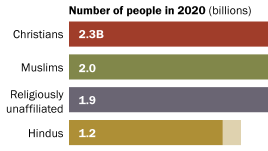
Many Religious ‘Nones’ Around the World Hold Spiritual Beliefs
Despite their nonreligious identity, many unaffiliated adults hold spiritual or religious beliefs. About a fifth or more in 22 countries believe in an afterlife, for example.
Numbers, Facts and Trends Shaping Your World
Despite their nonreligious identity, many unaffiliated adults hold spiritual or religious beliefs. About a fifth or more in 22 countries believe in an afterlife, for example.
All
Publications
Our 2014 Global Attitudes survey in 44 countries asked which among five dangers was considered to be the “greatest threat to the world.” Many in the Middle East said religious and ethnic hatred was the greatest threat, while Europeans tended to choose inequality. Africans are more concerned with AIDS and other infectious diseases, while scattered countries, many with good reason, chose the spread of nuclear weapons or pollution and environmental problems as the top danger.
Publics across the globe see the threat of religious and ethnic violence as a growing threat to the world’s future, with concern especially strong in the Middle East.
Christians remain the largest religious group, and Muslims grew the fastest from 2010 to 2020. Read how the global share of Buddhists, Hindus, Jews and the religiously unaffiliated changed.
Most who use astrology (or a horoscope), tarot cards or a fortune teller say they do so just for fun rather than for insights about life.
After years of decline, the U.S. Christian share now shows signs of leveling off. The new Religious Landscape Study explores trends in identity, beliefs and practices.
The Global Religious Futures (GRF) project is jointly funded by The Pew Charitable Trusts and The John Templeton Foundation. Here are some big-picture findings from the GRF, together with context from other Pew Research Center studies.





